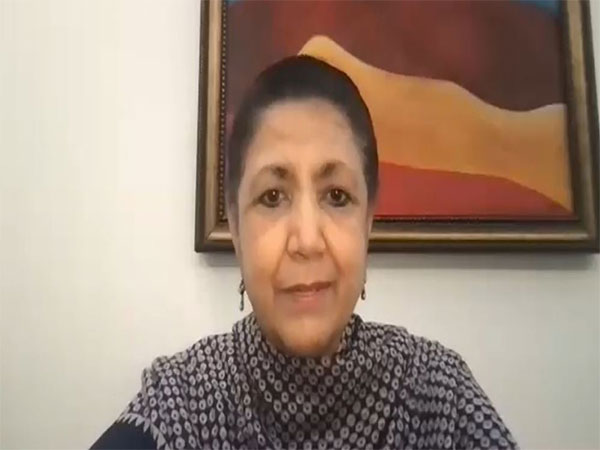New Delhi [India], September 23 (ANI): The former Indian Ambassador to the United States, Meera Shankar, on Sunday, appreciated the decision of Quad leaders to expand the maritime domain awareness program to the Indian Ocean amid concerns over the Chinese military’s increased forays into the region.
Speaking to ANI, Shankar also asserted that Quad is not just a temporary phenomenon, and “is here to stay.”
“It (Quad Leaders’ Summit) was also to assert that Quad is here to stay, that it is not just a temporary phenomenon, but it is here to stay, and it is going to its activities in the areas of maritime domain awareness,” she said.
The former diplomat further said that the development is significant from India’s point of view as earlier as Chinese incursions have been on rise in the Indian Ocean close to the Indian territory.
“They (Quad leaders) have taken the decision to expand the maritime domain awareness programs to the Indian Ocean. Hitherto it was confined to the Pacific and the South China Sea and so on, but now it is being expanded to the Indian Ocean, and India will be making its own contributions in this process,” Shankar said.
“So that’s very important from India’s point of view because we’ve had concerns that Chinese military presence has not just been limited to the East China Sea or South China Sea. Increasingly, they have been making forays into the Indian Ocean in areas very close to India, including Sri Lanka. And this is obviously something of concern to us. So we are happy that the maritime domain awareness program is being extended to the Indian Ocean,” she added.
The Quad leader, during the Leaders’ Summit on Saturday, announced a new regional Maritime Initiative for Training in the Indo-Pacific (MAITRI), to enable its partners in the region to maximize tools provided through IPMDA and other Quad partner initiatives, to monitor and secure their waters, enforce their laws, and deter unlawful behavior.
“We look forward to India hosting the inaugural MAITRI workshop in 2025,” the joint statement read.
The Quad leaders also welcomed the launch of a Quad maritime legal dialogue to support efforts to uphold the rules-based maritime order in the Indo-Pacific.
The former Indian envoy also praised the initiative on critical and emerging technologies, that the Quad is looking to create for a “reliable and resilient supply chain” so that these don’t get disrupted as it happened during the COVID-19 pandemic.
“One more aspect that I should stress is the whole critical and emerging technologies initiative, which is a very important element of Quad where they are looking to create, you know, reliable and resilient supply chains so that they don’t get disrupted as happened during COVID where all these supply chains get disrupted. And then you’ve seen countries squeezing exports, particularly China, for strategic reasons,” she said.
Shankar also said that the trajectory of the US-India relationship would hopefully continue towards an upward trend irrespective of the results of the US presidential elections in November.
“It’s a kind of reassurance in the sense that the strategic partnership is on course. Hopefully, whatever administration comes in the United States after the presidential election, the upward trajectory of the India-US strategic partnership will continue,” she said.
The former diplomat also said that India and the US have a win-win situation in terms of technological partnerships, with the US being a leading technological country and India providing technological capability that is competitive at reduced costs.
“There are a whole lot of new tech areas where the two countries want to work together. And of course, the US being the leading part in these technologies would be an important partner for India in terms of getting this initiative going. For the US, India provides a partner with the kind of technical capability that is competitive and can reduce costs and also help create diversified supply chains. So I think it’s a win-win situation for both countries and getting business leaders interested in it is the way to actually materialise this very ambitious project for cooperation, which if not actually concretised can remain,” she said.
Speaking on Sustainable Development Goals, she said that there is “very little time” to achieve those goals and stressed on improving life expectancy and reducing child mortality.
“There’s very little time left to achieve those sustainable development goals, be it with regard to climate change, be it with regard to sustainable development, be it with regard to affordable education and health being available to all countries. Improving life expectancy and reducing child mortality–we are very far from achieving the goals that we had agreed to achieve. And in many cases, it is the question of a lack of adequate finance for developing countries,” she said.(ANI)
Disclaimer: This story is auto-generated from a syndicated feed of ANI; only the image & headline may have been reworked by News Services Division of World News Network Inc Ltd and Palghar News and Pune News and World News
HINDI, MARATHI, GUJARATI, TAMIL, TELUGU, BENGALI, KANNADA, ORIYA, PUNJABI, URDU, MALAYALAM
For more details and packages











